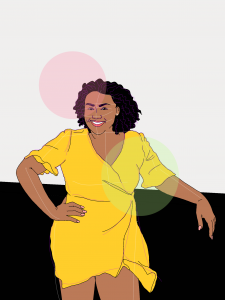14 Writing Social Justice: Thoughts from a WGSS Major
By Sarah Valdez, State University of New York at Albany

I love studying social justice more than most things.[1] I love critical thinking and anything that forces me to interpret the physical and conceptual world. I love discovering new things. I love uncovering profound truths about myself and my surroundings. I love to read and write; I can feel my mental library expanding when I do. Women’s, Gender, and Sexuality Studies (WGSS) has allowed me to pursue all of these interests, and the “Introduction to Feminisms” class showed me that I could combine my passion for writing with my personal investments in social justice. Before that class, I was curious about sociopolitical issues, but I never looked too much into them because I was afraid of being too inflammatory or controversial. I became interested in active resistance, but only what I consider to be a “safe” amount; I hesitated often because I knew that my community would not approve.
I came to college. I entered classrooms where I was surrounded by people who wanted to talk about their perspectives. My classmates came from all walks of life—they were Black, white, rich, poor, conservative, and progressive. I took “Introduction to Sociology;” “Feminist Pedagogy in Theory;” “Feminist Pedagogy in Practice;” “Classism, Racism, Sexism.” I began to learn in-depth about the physical, emotional, socioeconomic, medical, and generational consequences of racism, antiblackness, queerphobia, gender inequality, neoliberalism, and countless other things. I watched Ava Duvernay’s documentary 13th on Netflix—I watched it four times. I read Between the World and Me by Ta-Nehisi Coates. I read parts of The New Jim Crow by Michelle Alexander. I began to feel deeply invested in antiracist activist work but, at some points, I had to stop myself and take a step back—it was too much to process all at once and I could physically feel my mind working harder than usual.
In spite of how overwhelming the topics often are, my WGSS classes have become some of my favorites because they force me to think. These new lessons are significant to me not just because they are interesting, but because they enable me to link what I learn in class to what I see happening around me every day.[2] For example, I walk back to my apartment and I notice, viscerally, that a university police officer is parked right in front of my building. I think back to what I learned about the historical development of policing as a modern-day iteration of racialized and socioeconomic control, and I think back to the many times that my friends of color and I were pulled over in my very white, very middle-class hometown, seemingly for no reason. I wonder if my white classmates experienced it as frequently or aggressively as we did. I am suddenly so much more … aware. That feeling of finally being awake is what compelled me to become a WGSS major. My personal investment in Women’s, Gender, and Sexuality Studies are drawn along the lines of pro-Black feminism, and the idea that although I experience sexism and misogyny, many of my interactions with the Western establishment are the result of being a Black-identified “other,” not solely because I am a woman. For this reason, I have become primarily focused on tapping into what Layli Maparyan calls the “liberation impulse,” or the instinctual pursuit of freedom that comes as a result of learning about the many different types of progressive feminisms (2012, 31).
My engagement with Women’s, Gender, and Sexuality Studies helps me better understand that in a world like ours, it is okay to be enraged, tactful, and articulate all at once. I love feminist research papers that have big, complicated words in them—the ones that demand my attention, the ones that obligate me to “Google” them. But I also love non-academic writing that puts me in touch with other people and communities. I love learning about the many lived experiences. I could spend forever talking to other people about their positionalities, journeys, concerns, and points of view. My studies only serve the purpose of bridging my understanding of the world with my daily human interactions. After all, what is the point of studying equity and justice if I do not bother to apply what I learn in a meaningful, impactful way?
For all of these reasons and many more, I am proud to say that I am a double major in Women’s, Gender, and Sexuality Studies and English. Whatever job opportunities or career paths might be ahead, I know that being invested in social justice work is my true purpose.
Works cited:
Alexander, Michelle. 2010. The New Jim Crow: Mass Incarceration in the Age of Colorblindness. New York, NY: The New Press.
Coates, Ta-Nehisi. 2015. Between the World and Me. 2015. New York, NY: Spiegel and Grau.
DuVernay, Ava and Jason Moran. 2016. 13th. USA. Netflix.
Maparyan, Layli. 2012. “Feminism,” in Rethinking Women’s and Gender Studies, eds., Catherine M. Orr, Ann Braithwaite, and Diane Lichtenstein, 17-33. New York, NY: Routledge.

